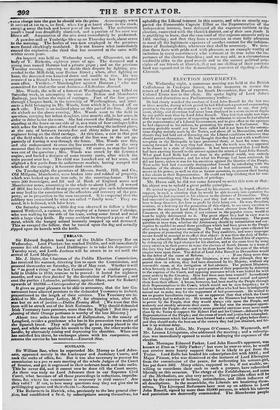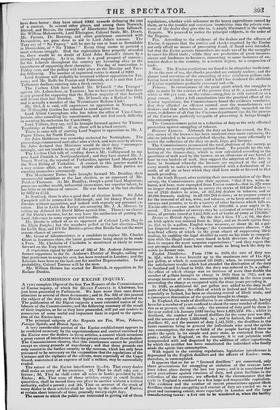ELECTION MOVEMENTS.
On Wednesday night, a numerous meeting was held at the British Coffeehouse in Coekspur Street, to take measures to secure the return of Lord John Russell, for South Devonshire, free of expense. Colonel Evans was in the chair. He spoke highly of Lord John's talents and discretion as a Parliamentary leader— He had closely watched the conduct of Lord John Russell for the last two or three months, during which period he had filledsuch a great and commanding position in the eyes of the country ; and he you'd venture to say, that judg- ment, ability, and discretion had never been displayed in a more eminent degree by any public man than by Lord John Russell. They had that night met toge- ther for the specific purpose of supporting the nobleman to whom he had alluded as the representative of a Liberal Government, and to give effect to the opinions he had expressed in his address, by promoting his return to Parliament. The meeting probably would not have been called had it not been for the ostenta- tious display recently made by the Tories, and above all in Devonshire, and the threats they had held out of throwing out the Liberal candidates wherever they should present themselves. He had thought that they had met with a sufficient reception in the Metropolis to have prevented them, at least for some time, coining forward in the way they had done ; but the truth was, they appeared to be almost in a state of desperation. It had been reported that Lord Rolle had been exerting himself to the utmost against the return of Lord John Russell. What good Lord Rolle had ever done in the political world, was entirely beyond his comprehension ; and for what his Peerage had been conferred, he did not know, unless it was for his exertions against the liberties of the People. That noble lord had constantly distinguished himself by interfering with the franchise of the electora of Devonshire; and he had endeavoured, by every means in his power, as well on this as former occasions, to prevent their having a free choice in their Representative. He could not help thinking that his con- duct was something very like a breach of privilege. Mr. Hume said, he (lid not come forward to assist this man or that: his object was to uphold a great public principle— He wished to place Lord John Russell by his sincere, and, he hoped, effective support, in such a situation that lie would be able to carry into operation the principles lie had expressed in his address to the electors of Devonshire. They had succeeded in ejecting the Tories ; and they had now to consider not only how to keep them out, but how to profit by their being out. He was, therefore, anxious, as a first step fur the promotion of this object, to use every exertion to promote the return of Lord John Russell ; whose absence from the House of Conimons at the present time, if not ruinous to the popular cause, would at least be highly detrimental to it. The great object they had in view was to support the cause of the Democracy against that of the Aristocracy. The great question at issue was, whether the Aristocracy should by intimidation and car • 'option be enabled to annul those privileges which had been given to the People after such a long and severe struggle. They had some large SLIM collected for the purpose of promoting the return of the Tory candidate, and every improper means would be resorted to to effect that object : it was then the duty of Refor- mers to subscribe sufficient funds to return Lord John Russell free of expense, by defraying all the legal charges for his election, and at the same time by using every exertion in their power to rouse the electors of South Devon to a sense of the duty they bad to perform, and to let them know that the eyes of the whole empire were upon them. The defeat of Lord John Russell in Devonshire would be the defeat of the cause of Reform lions thing more than another induced him to support the Ministers, it was that although they ap- peared slow in reform, they had been dismissed by his Majesty, without any reasonable cause, at the instigation of bad advisers. The present Ministers, when formerly in office, had lost a great portion of their popularity by deferring to the caprices of the Court, and opposing measures which were looked for with great anxiety by the Country. How had these men been treated? Immediately the Court thought they had sufficient power, they turned round and ejected them from their offices. A lesson, however, had been read by the People through their Representatives to the Court, which would not be soon forgotten ; for it had to beseech those men to return and accept office who had been so indignantly turned out to make way for the supporters of bad government. Ile wished to see no greater humiliation imposed on an opponent than that which the Court had recently had to submit to. He trusted, as the Ministers had been returned to power by the People, that they would always rely upon the People, and zealously and steadily advocate their cause. He had seen the strongest opposi- tion against the People—for certainly more powerful exertions were never made than by the Tories to support Sir Robert Peel and his Cabinet—defeated by the Representatives of the People; and the cause of truth and justice had triumphed. The Government which had now been formed had a career of glory before them; and they should make the best use of the victory they had just obtained, and fol- low it up without delay.
Sir John Scott Lillie, Mr. Fergus O'Connor, Mr. Weymouth, and Mr. Lennox Livingstone, also addressed the meeting ; and a subscrip- tion was immediately opened to assist in defraying the expenses of the election. Mr. Montague Edmond Parker, Lord John Russell's opponent, was known at Eton as "Silly Parker;” but were he ever so wise, he would not receive more hearty support than he is likely to get from the Tories. Lord Rolle has headed his subscription-list with 1000!.; and Major Pitman, who was dismissed at the instance of Lord Ebrington from the commission of the peace, for maltreating his servant-gul, has put down 500/. Many others, supposed to be, if not unable,.un- willing to contribute their cash to such a purpose, have subscribed liberally on this occasion. The clergy of the Establishment, and some of the Methodists, are also very active. Every possible effort will be made by the exercise of bribery, intimidation, and illicit influence of all descriptions. In the meanwhile, the Liberals are bestirring them- selves. The Liverpool Reformers have sent up an address to Lord John Russell, signed by more than 10,000 persons, in which his talents and patriotism are deservedly commended. The Manchester people have done better : they have raised 1000/. towards defraying the cost of a contest. In several other places and among them Norwich, Stroud, and Brecon, the example of Manchester has been followed. Sir William Molesworth, Lord Ebrington, Colonel Seale, Mr. Divett, Mr. Parrott, Dr. Bowring, and other gentlemen connected with Devonshire, are gone done to aid in Lord John's canvass. The Tory cry of " No Popery" will be met by one at least as formidable in Devonshire, of " No Tithes! " Every thing seems to portend a most arduous struggle. Had the registration been properly attended to, there would be no doubt of Lord John Russell's return by a triumphant majority. As it is, there is a good prospect of success ; for the Liberals throughout the country are becoming alive to the importance of supporting their champion. The day of nomination is Friday !lest, and the polling will take place on the Monday and 'Tues- day following. The number of registered voters is stated at 8200. Lord Seymour will probably be returned without opposition for Tot- ness ; and Mr. Rolfe for Petiryn and Fahnoutb, as it is said that Lord Tullamore declines entering into a fresh contest. The Carlton Club have backed Mr. D'Israeli " the Younger" against Mr. Labouchere, at Taunton ; but we have not heard that there is any ground for supposing that the Reform majority of that borough will desert their late Member. Mr. D'Israeli was a Radical in 1833, and is actually a member of the Westminster Reform Club ! Mr. Ord, it is said, will experience no opposition in Newport, as Sir Willoughby Gordon has refused to stand against him.
Lord Albert Conyngham, who has taken the office of Vice- Cham- berlain, after consulting his constituents, will not find much. difficulty in securing his reelection for Canterbury.
Lord Villiers, they say, will be brought forward against Sir Thomas Troubridge at Sandwich. If so, there will be a hard contest. There is some talk of starting Lord Nugent in opposition to Mr. J. Payne Elwes, for North Essex. Sir John Hobhouse was yesterday reelected for Nottingham. The proceedings commenced soon after nine o'clock, and were over by eleven. Sir Jtilin declared that Ministers would do their duty " uncotnpro- niisingly, and not truckle to any of the parties in the State." The Carlton Club talk of sending down a Mr. Collingwood to op- pose Lord llowick in Northumberland ; and they have started Mr. J. Stuart Worrey, the rejected of Forfarshire, against Lord Alorpeth for the West Riding of Yorkshire. A contest in this quarter would be a very serious affair, as there are 18,000 electors. Both parties are exerting themselves strenuously. The Manchester Tories have brought forward Mr. Braidley, their unsuccessful candidate at the last election, as an opponent of Mr.
Poulatt Thomson. As Mr. Braidley, though a good local Magistrate, possesses neither wealth, influential connexions, nor superior talent, he has little or no chance of success. He was beaten at the last election by 3372 to 2352. In Scotland, there is also a good deal of election bustle. Sir John Campbell will be retunted for Edinburgh, and Sir Henry Parnell for Dundee without opposition, and indeed with scarcely any personal ex- ertion. But in Leith the Tories are annoying Mr. J. A. Murray, by setting up Admiral Sir David Milne against him. There is no chance of Sir David's success, but he may have the satifaction of putting the Lord Advocate to some expense and trouble. Mr. Brodie is talked of as an opponent of Colonel Leith Hay in the Elgin Burghs; but the numbers polled at the last election-195 for Leith Hay, and 111 for Brodie—prove that Brodie has not the most remote chance of success.
Mr. Grant of Glenmorriston is a candidate to replace Mr. Charles Grant in Inverness. shire, the latter gentleman being about to be made a Peer. Mr. Chisholm of Chisholm is mentioned as likely to come forward on the Tory interest. A requisition signed by 230 out of 332 of Mr. Andrew Johnstone's former supporters in the St. Andrew's District of Burghs, calling on that gentleman to resign his seat, has been received in London ; and the Liberals have been on the look-out for another Representative. In all probability, Colonel Torrens will be the man.
Mr. William Holmes has started for Berwick, in opposition to Sir Rufane Donkin.



























 Previous page
Previous page